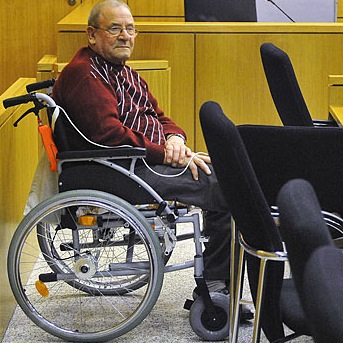Time has finally run out for Heinrich Boere, the former SS killer who has for over six decades used every possible legal avenue to dodge conviction for the wartime murder of three Dutch civilians. Today the 88-year-old was jailed for life by a German court.
“These were murders that were committed on a totally random basis,” said Gerd Nohl, presiding judge in Aachen in western Germany. Boere, who is wheelchair-bound, appeared to be drained of emotion, shaking his head when he heard the verdict.
Throughout the trial he has cracked jokes and, out of the courtroom, cheerfully admitted killing the Dutchmen in a reprisal action.
How could you do it? he was asked by reporters. The men were, as Judge Nohl pointed out, killed at random. The rule in the occupied Netherlands was that for every attempt on the life of a German or a German collaborator, three Dutchmen had to die.
“Not difficult, you just curled your finger around the trigger and pulled – bang!” He found this answer so amusing that he repeated it several times in different interviews, laughing out loud each time. “It was really simple.”
There was nothing simple about Boere’s evasion of justice, which allowed him to go unpunished for crimes that he freely boasted about. The inability of German courts to convict him irritated Dutch-German relations – Boere had been sentenced to death in absentia by an Amsterdam court in 1949 but was able to live freely in Germany, working as a coal miner until 1976, drawing a German pension and then living in a German nursing home.
Boere’s ducking and weaving within the German judicial system illustrated how much unfinished business was left after the post-war Nuremberg trials. More than 25,000 cases of Nazi crimes were investigated by West German authorities after the post-war trials of surviving Nazi leaders, but the prosecution was often half-hearted and many cases were dropped.
Boere was born in Eschweiler, Germany – on the outskirts of Aachen, where he lives today. The son of a Dutchman and a German woman, he moved to the Netherlands when he was an infant.
Boere joined the Waffen-SS in 1940 after the German invasion of the Netherlands.
He calculated that the partial German parentage and SS membership would secure him German citizenship after the Second World War– and this indeed became one of his get-out-of-jail free cards. West German courts accepted that Boere had the right to German citizenship, and under national law, Germans living in Germany could not be extradited.
Boere fought against the Red Army in the Caucasus with the Waffen SS, fell ill and returned to Holland in 1943. At the time more than 100,000 Dutch Jews were being deported to death camps and half a million Dutchmen were forced labourers.
The resistance was starting to fight back, gunning down collaborators in cafés. Boere was in an SS reprisal unit: he killed, in short order, a pharmacist, a businessman and a bicycle shopowner. The son of the bicycle shop owner, Teunis de Groot, was in court during the five-month trial – and he was present when his father was shot down by Boere on a Sunday morning in 1944.
“It was the end of my childhood,” he said in the witness stand. He was 11 at the time.
Boere escaped from a prisoner of war camp in 1947 and moved to Germany. Even when the Dutch death sentence was commuted to life imprisonment, the West Germans did not attempt to send him back over the border. The case lapsed until 1980 when the Dutch lodged a formal extradition request. But the German prosecutors office decided that Boere’s killings were “acceptable acts of war” in response to the supposedly illegal acts of the Dutch resistance.
The Dutch continued to push. In 2003 they urged the Germans to make Boere sit out his life imprisonment in Germany. This was at first accepted, then overturned by a higher German court.
It was only when an energetic state prosecutor, Ulrich Maass, took up the case that Boere was brought to trial. Even then Boere’s layers argued that health issues made a trial impossible.
Boere is said to be considering yet another appeal. The judge has yet to rule where he will have to serve out his sentence.
